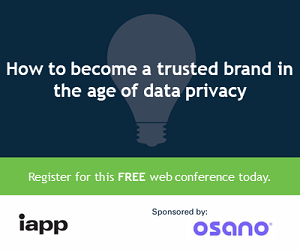The Privacy Advisor is pleased to bring you this Q&A with Viktor Mayer-Schönberger, author of Delete: The Virtue of Forgetting in the Digital Age, and associate professor of public policy and director of the Information and Innovation Policy Research Centre at the LKY School of Public Policy/National University of Singapore. He will present a keynote at the IAPP Global Privacy Summit on April 21.
Privacy Advisor: How big of a problem is perfect remembering? Or how big could it become?
Viktor Mayer-Schönberger: Perfect remembering may cause two potentially serious problems. First, due to perfect memory we must assume that whatever we say or do online today may be held against us in the distant future—and likely taken out of the context it had today. As people begin to realize this, they may self-censor.
In fact, this is what President Obama and colleges around the U.S. and elsewhere already advise students: do not post anything anymore that might become controversial in the future. But this is exactly the opposite of what we need—it impoverishes the robust public dialogue and open conversation that is the very thread that makes the fabric of our democratic pluralistic society. Moreover, self-censoring due to perfect digital memory online, much like a temporal panopticon would do, would deny us the value of the powerful tools (Web 2.0, peer production, crowd sourcing, etc.) we now have to jointly produce and share knowledge.
Second, perfect memory may also confuse how we think and decide. Forgetting is important for humans, as it permits us to generalize and to abstract, thereby seeing the forest (and forgetting about the individual trees).
Forgetting also enables us to evolve, to grow, and to change over time. Perfect memory not only denies us humans our ability to change over time, it may also prevent us from generalizing and forgetting. This is what humans with near perfect memory complain about: that they do not have available to them the virtue of forgetting, and thus a mechanism by which they can shut out every detail of their past. Perfect memory will, in the words of famous author Jorge Luis Borges, deny us the essence of what makes us truly human.
Moreover, forgetting also facilitates forgiving—individually and as a society.
Finally, as we begin to trust perfect digital memory over our own human recollection, we may become singularly dependent on digital memory, the authenticity of which is unproven. Whoever in the future will control large swaths of our digital memory (Flickr? YouTube? Google?) will be able to change history.
PA: What will be the effects 20, 50, 80 years down the road on individuals with online identities today if we continue to keep information endlessly?
VMS: The first generation of digital natives will be supremely vulnerable, as much of their early digital lives will remain accessible. Later generations will have become well versed in self-censorship from the beginning, with the consequence of an impoverished societal dialogue. Two decades into the future we may look back at our times and think that we had a unique window of opportunity to take a step towards a democratic and inclusive society founded on robust and open dialogue, and facilitated by powerful technical tools, but a prurient impulse of voyeurism and a human propensity to collect had led us to abandon forgetting and thus deny us all what was possible.
PA: Surely there are positive outcomes to perfect remembering. What leads you to believe that the negatives outweigh the positives in this instance?
VMS: Yes, of course perfect memory also has upsides. I do not believe it is easy to weigh the upsides and downsides. How should we do this? Cost-benefit analysis? With what time-frame?
I suggest that perfect memory has potentially extremely grave consequences years and decades out, even though it may look benign today. And exactly for such situations we have developed the precautionary principle: it may be important to act cautiously now rather than opt for a path that we will not be able to correct in the future.
PA: How does the ‘virtue of forgetting’ apply to corporations beyond the reduced risk of data theft and lower storage costs?
VMS: If individuals have effective choice over what information they want to have remembered for how long—for example through an expiration date for information—they can decide what information is still relevant to them.
Often (although not always), this is well aligned with what information is valuable for corporations. Take Amazon's book recommendations: if I had an easy way to tell Amazon that a travel guide I ordered should only be used for book recommendations for the next two months (and thus before I go on my trip) but not afterwards, this will help improve the quality of Amazon’s book recommendations to me—a win for both sides.
PA: Can you give us a preview of your keynote address?
VMS: Yes, I will summarize the big themes of my book—especially on the challenges we face—from a self-censoring polity and unforgiving society, to individuals unable to act in the present or without the necessary critical distance to examine their history. I will also look at possible responses and explain why there is no silver bullet, only a pragmatic combination of measures, including some novel ones.






























Comments
If you want to comment on this post, you need to login.